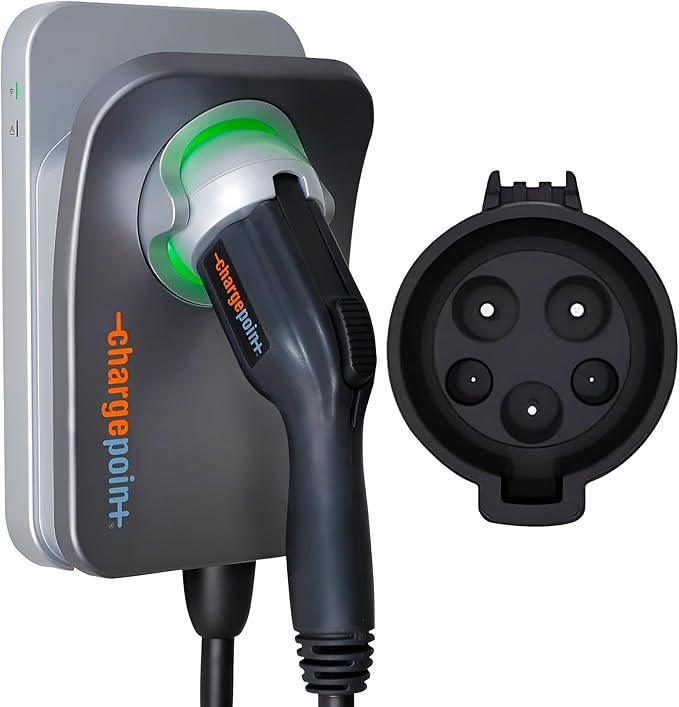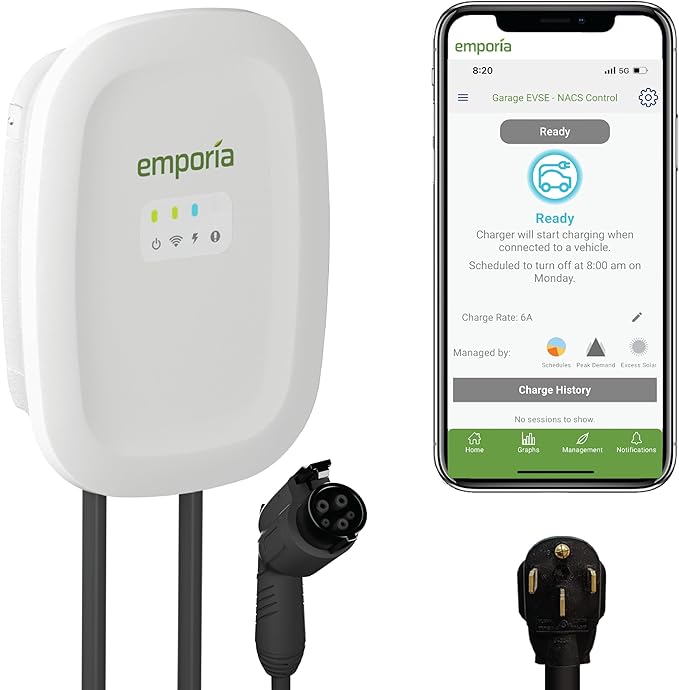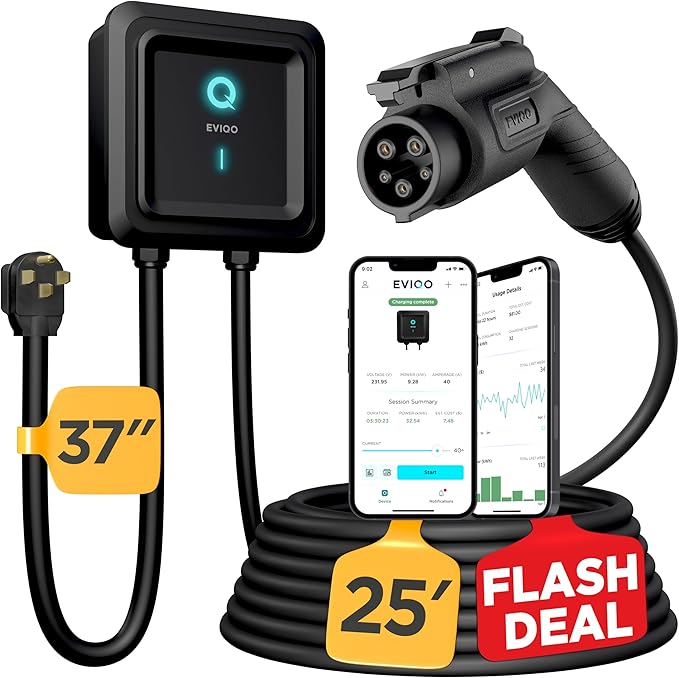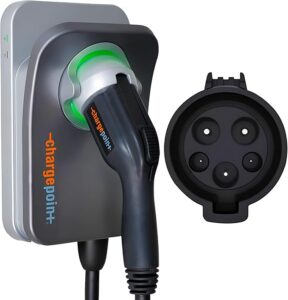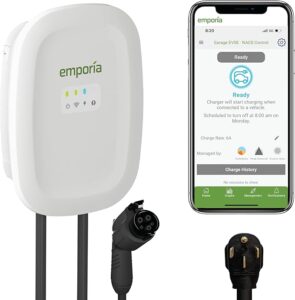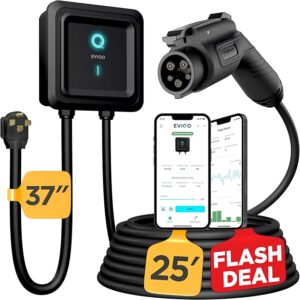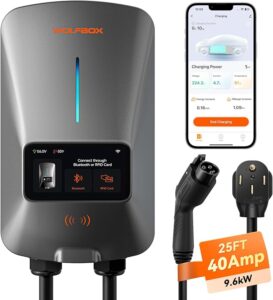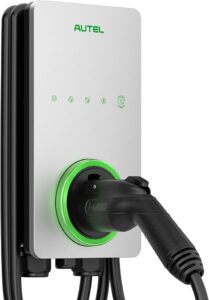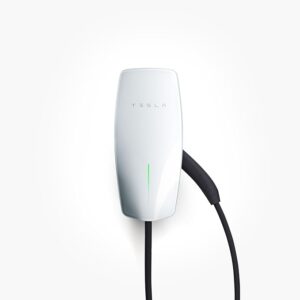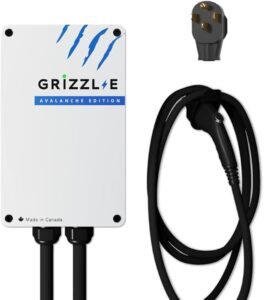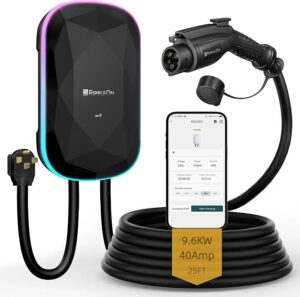As electric vehicles (EVs) continue to rise in popularity, the need for reliable and efficient home charging solutions has never been greater. While public charging stations are expanding, nothing beats the convenience of plugging in your EV overnight and waking up to a full battery. That’s where Level 2 EV chargers come in. In this guide, we’ve tested and reviewed the best Level 2 EV chargers for home use. Whether you’re a first-time EV owner or looking to upgrade your current setup, we will help you choose the right charger based on performance, features, ease of installation, and overall value.
List of the Best Level 2 EV Charger for Home:
Check out the detailed reviews of the best Level 2 EV charger for home below.
1. ChargePoint HomeFlex Level 2 EV Charger for Home
The ChargePoint HomeFlex Level 2 EV Charger is a powerful, smart home charging solution designed for reliability, speed, and control. Hardwired for stable performance, it delivers up to 9 times faster charging than a standard 110V outlet, providing up to 37 miles of range per hour depending on your EV’s capability. Compatible with all non-Tesla EVs via the J1772 connector, it also supports Tesla vehicles with an adapter.
This unit can be installed on circuits ranging from 20A to 80A, offering flexibility based on your home’s electrical system. The ChargePoint mobile app lets you schedule charging, track energy use, and receive updates—all from your phone. It also integrates with smart home systems, enhancing user control.
Tested under real conditions, users report consistent charging speeds of 30–35 miles per hour, a solid build that withstands the elements, and a long cable that easily reaches various parking spots. While the Wi-Fi setup and app experience can vary, the charger’s core performance and safety certifications (UL-listed) make it a trustworthy investment for daily charging.
Key Features, Pros, and Cons
Key Features
- Delivers up to 37 miles of range per hour
- Works with 20A–80A circuits for flexible installation
- Smart app for scheduling, usage tracking, and control
- Compatible with all J1772 EVs; Tesla adapter needed
- UL-certified for safe indoor/outdoor installation
Pros
- Fast and consistent charging speed
- Reliable build and durable outdoor performance
- Long cable offers placement flexibility
- Smart home and app integration
- Access to a vast charging network
Cons
- Wi-Fi setup can be inconsistent
2. EMPORIA Classic Level 2 EV Charger for Home
The Emporia Classic Level 2 EV Charger is a high-performance home charging solution engineered for speed, flexibility, and smart energy management. Designed for residential use, it delivers up to 48 amps of charging power via a hardwired connection, offering a top speed of up to 46 miles of range per hour. When used with a NEMA 14-50 plug, it supports 40 amps and delivers approximately 38 miles per hour, making it up to 9 times faster than a standard 110V outlet.
This charger supports both plug-in and hardwired installations, giving homeowners the option to choose based on their setup. It’s UL listed and ENERGY STAR certified, complying with rigorous safety standards like NEC 625 and SAE J1772. The 25-foot cable offers extended reach, while the durable housing makes it suitable for both indoor and outdoor installations.
The Emporia app, accessible via 2.4 GHz Wi-Fi, enables remote monitoring, scheduling, and real-time energy tracking. Users can optimize charging times to align with lower utility rates, contributing to energy savings.
Key Features, Pros, and Cons
Key Features
- Delivers up to 46 miles of range/hour at 48A
- Dual installation: NEMA 14-50 plug or hardwired
- UL listed and ENERGY STAR certified
- 25-foot cable with SAE J1772 connector
- Wi-Fi app for scheduling and energy monitoring
Pros
- High-speed charging up to 48A
- Easy installation with flexible options
- Excellent safety and certification standards
- Sturdy build and long cable
- Real-time energy data via app
Cons
- App interface can be inconsistent
- Requires 2.4 GHz Wi-Fi only
3. EVIQO Level 2 EV Charger for Home
The EVIQO Level 2 EV Charger is a robust and high-capacity home charging solution offering up to 48 amps of output power and 11.5 kW charging capability. Designed for versatility, it supports both plug-in (NEMA 14-50) installation for 40A operation and hardwired configuration for full 48A charging—making it up to 9 times faster than a standard Level 1 charger. Depending on your setup, it can deliver up to 46 miles of range per hour, providing a fast and efficient way to recharge at home.
This EVSE is UL, Energy Star, ETL, and FCC certified, ensuring safety and compliance. It is rated NEMA 4 and IP66, making it fully weatherproof for both indoor and outdoor use. A standout feature is its 25-foot heavy-duty cable, along with a 37-inch input whip, providing extra reach and flexibility.
The EVIQO app, developed with feedback from over 1,800 EV owners, allows users to adjust current settings, set up to three charging schedules, track energy usage, and receive smart tips. OTA firmware updates enhance its functionality over time.
Key Features, Pros, and Cons
Key Features
- Adjustable up to 48A (11.5 kW) for fast charging
- Plug-in or hardwired installation with flexible configuration
- UL, Energy Star, NEMA 4, and IP66 certified
- Smart app for scheduling, tracking, and remote updates
- 25-foot charging cable + 37-inch input cable for extended reach
Pros
- Fast, efficient charging up to 46 mi/hr
- Durable weatherproof design
- Intuitive, customizable mobile app
- Long cables for easy garage setup
- Compatible with all EVs (Tesla adapter needed)
Cons
- 48A use requires hardwiring and 60A circuit
4. WOLFBOX Level 2 EV Charger for Home
The WOLFBOX Level 2 EV Charger delivers efficient, user-friendly charging with 40 amps of power, offering speeds up to 7 times faster than Level 1 chargers. Capable of adding approximately 38 miles of range per hour, this charger operates on a 240V NEMA 14-50 outlet, making it ideal for fast, reliable home use.
This unit is CSA certified and compliant with UL2594 safety standards, ensuring safe operation. The NEMA 4X-rated waterproof housing makes it suitable for both indoor and outdoor installation. The 25-foot premium cable provides ample reach for flexible vehicle placement in your garage or driveway.
A standout feature is the 4.3-inch LCD display, which shows charging speed, time, voltage, and total kWh. Additionally, the charger offers smart Wi-Fi connectivity, allowing you to adjust current, schedule charging, and monitor real-time data via the WOLFBOX app. It also supports Google Assistant and Alexa for voice control, and includes RFID card access for added security.
Key Features, Pros, and Cons
Key Features
- 40A output, adds up to 38 miles per hour
- NEMA 14-50 plug with CSA and UL2594 certification
- Smart app, LCD screen, Alexa/Google integration
- 25ft cable and NEMA 4X waterproof housing
- RFID card for secure access
Pros
- Fast, efficient charging at home
- Voice control and multi-user smart app
- Easy plug-in installation
- Durable and weatherproof build
- Sleek design with LCD feedback
Cons
- May lack advanced scheduling features
5. Autel Level 2 EV Charger for Home
The Autel Home Level 2 EV Charger is a powerful, smart home charging station engineered for reliability and speed. With up to 50 amps of output and 12 kW of charging capacity, it can deliver up to 37 miles of range per hour, depending on your EV model. Designed for hardwired installation, this unit is built for long-term residential use and is rated for both indoor and outdoor environments.
Backed by Autel’s 20 years of automotive engineering, the charger features a durable, cold-resistant 25-foot cable, designed to remain flexible even in temperatures as low as -40°C (-40°F). It’s CSA certified and NEMA 4 rated, offering full protection against snow, rain, dust, and other environmental hazards.
The Autel Charge app provides full smart control, allowing users to schedule charging, monitor real-time usage, and optimize electricity costs by targeting off-peak hours. It also supports OCPP 1.6J, making it compatible with advanced home energy management systems.
Key Features, Pros, and Cons
Key Features
- Up to 50A hardwired output (12 kW)
- Delivers up to 37 miles of range per hour
- CSA certified, NEMA 4 weatherproof rated
- Smart app for scheduling and tracking
- Cold-resistant, flexible 25-ft cable
Pros
- Fast, high-capacity charging
- Reliable performance in all weather
- Strong smart app functionality
- Durable, professional-grade design
- Wide EV compatibility
Cons
- Requires 60A circuit for full output
6. Tesla Wall Connector Level 2 EV Charger for Home
The Tesla Wall Connector is a high-performance Level 2 EV charger engineered specifically for Tesla vehicles, including Model S, 3, X, and Y. It offers up to 48 amps of power and 11.5 kW of charging capacity, delivering as much as 44 miles of range per hour, depending on your Tesla model and circuit breaker configuration. With its sleek design and robust build, it supports both indoor and outdoor installation.
One of the key benefits is its adjustable amperage, which allows it to be customized for a variety of electrical setups—from 12A to 48A, ensuring compatibility with most residential power supplies. The 24-foot cable offers ample length for flexible vehicle positioning, while Wi-Fi connectivity enables seamless integration with the Tesla app, providing firmware updates and remote access.
Additionally, the power-share feature allows up to six Wall Connectors to be linked, making it ideal for multi-Tesla households or shared garages.
Key Features, Pros, and Cons
Key Features
- 48A output, up to 44 miles of range/hour
- 24-foot cable with adjustable amperage settings
- Compatible with all Tesla models
- Wi-Fi enabled for app control and updates
- Power-sharing for multi-Tesla households
Pros
- Fast, efficient Tesla charging
- Sleek, durable design
- Easy app connectivity and setup
- Flexible installation options
- Excellent value for Tesla users
Cons
- Not compatible with non-Tesla EVs
7. Grizzl-E Classic Level 2 EV Charger for Home
The Grizzl-E Classic Level 2 EV Charger (Avalanche Edition) is a rugged and reliable charging station built for performance in all weather conditions. With a maximum output of 40 amps and a charging speed of up to 30 miles of range per hour, it provides a fast and convenient home charging solution for all EVs and PHEVs sold in North America. It connects via a NEMA 14-50 plug and includes a durable 24-foot premium cable, offering reach and flexibility for various garage setups.
Designed for both indoor and outdoor use, the Grizzl-E is housed in a NEMA 4-rated, IP67-certified metal enclosure, making it water-resistant, fire-resistant, and dustproof. The unit is UL certified and includes comprehensive protection systems, including overcurrent, overvoltage, undervoltage, ground fault, and temperature safeguards. It also features self-monitoring and automatic recovery, ensuring uninterrupted charging.
Users can adjust the amperage between 16A and 40A, depending on their home’s circuit capacity, making it versatile and cost-effective. With its plug-and-play installation and portable design, the Grizzl-E offers power, protection, and value—all in one no-nonsense package.
Key Features, Pros, and Cons
Key Features
- Up to 40A output with adjustable amperage
- Charges up to 30 miles of range per hour
- UL certified, IP67, NEMA 4-rated for all-weather use
- 24-ft heavy-duty cable and NEMA 14-50 plug
- Self-monitoring, power outage recovery, and built-in GFCI
Pros
- Fast, reliable home charging
- Extremely durable for outdoor use
- Easy plug-in installation
- Portable and simple to relocate
- Excellent safety and build quality
Cons
- Cable may feel bulky for some users
- No smart app or Wi-Fi features
8. RIPPLEON Level 2 EV Charger for Home
The RIPPLEON Level 2 EV Charger delivers powerful and efficient home charging with a 40-amp output and 9.6 kW capacity via a 240V NEMA 14-50 plug-in connection. Designed to charge up to 9 times faster than Level 1 chargers, it provides a full charge in just a few hours, making it ideal for daily EV drivers who need quick, reliable energy at home.
Certified by ETL, FCC, and Energy Star, and rated IP65, this unit performs well in harsh weather conditions, from -22°F to 131°F, and is safe for both indoor and outdoor installations. The charger features a 25-foot cable with a standard J1772 connector, ensuring broad compatibility with all non-Tesla EVs. Tesla drivers can use an adapter available through the manufacturer.
The charger includes smart Wi-Fi connectivity, allowing users to manage scheduling, track charging history, and receive real-time alerts through a dedicated mobile app. The customizable LED ambient light offers visual status updates and a stylish touch.
Key Features, Pros, and Cons
Key Features
- 40A output, 9.6 kW via 240V NEMA 14-50 plug
- ETL, FCC, Energy Star certified; IP65 rated
- Smart Wi-Fi app with scheduling and OTA updates
- 25-ft cable with J1772 connector
- Custom LED lighting for real-time status
Pros
- Fast, efficient home charging
- Durable in extreme temperatures
- User-friendly app with helpful features
- Long cable for flexible setup
- Sleek design with ambient lighting
Cons
- Only supports 2.4 GHz Wi-Fi
- No built-in energy monitoring display
What is a Level 2 EV Charger?
Electric vehicles (EVs) are rapidly becoming more popular, and as more people make the switch, understanding how to charge them efficiently becomes essential. Among the available options, Level 2 EV chargers strike the best balance between speed, affordability, and practicality for home use.
Charging Levels Overview
There are three main types of EV charging levels:
| Charging Level | Voltage | Charging Speed | Typical Use Case |
|---|---|---|---|
| Level 1 | 120V | ~4–5 miles/hour | Basic home charging |
| Level 2 | 240V | ~20–60 miles/hour | Home and public charging |
| Level 3 (DC Fast Charging) | 400V+ | ~100–300 miles/30 min | Commercial/highway stations |
Level 1 uses a standard household outlet, but it’s very slow. A full charge can take over 24 hours depending on the vehicle. Level 3 is extremely fast but requires industrial-level power and is not suitable for home installation.
This makes Level 2 the ideal choice for most EV owners who want reliable and faster home charging.
How Level 2 Chargers Work?
A Level 2 EV charger uses a 240-volt outlet, similar to what is used for a clothes dryer or electric oven. It delivers significantly more power than a Level 1 charger, allowing your EV to recharge overnight or even faster, depending on the vehicle’s battery size and the charger’s amperage.
Most Level 2 chargers provide between 16 to 50 amps, which translates to charging speeds of about 3.3 kW to 12 kW. The actual speed depends on both the charger and the vehicle’s onboard charging capacity.
Connector Type and Compatibility
The vast majority of Level 2 chargers in North America use the J1772 connector, which is compatible with nearly all EVs, including models from Tesla (with an adapter), Nissan, Chevrolet, Ford, BMW, and more.
Why Choose Level 2 for Home?
For most EV owners, Level 2 charging offers a perfect mix of speed and convenience. A typical daily commute can be fully recharged in just a few hours. You can plug in overnight and start each morning with a full battery — no more waiting at public charging stations or dealing with the sluggish pace of Level 1 chargers.
How to Choose the Best Level 2 EV Charger for Home?
Choosing the right Level 2 EV charger for your home isn’t just about picking the fastest or the cheapest option. A good home charger should fit your car, lifestyle, and future needs. Below are the most important features to keep in mind when evaluating your options.
Charging Speed and Power Output
One of the key metrics to consider is amperage. Most Level 2 chargers range from 16 amps to 50 amps. Higher amperage means faster charging, but only if your vehicle and electrical panel can support it.
| Amperage | Approximate Power Output | Miles of Range per Hour |
|---|---|---|
| 16A | 3.3 kW | 10–12 miles |
| 32A | 7.7 kW | 25–30 miles |
| 40A | 9.6 kW | 30–35 miles |
| 50A | 12 kW | 37–45 miles |
Check your vehicle’s maximum onboard charger capacity to determine how much power it can accept. Buying a 50A charger doesn’t help if your EV can only accept 32A.
Connector Type and Cable Length
Nearly all Level 2 chargers in North America use the J1772 connector, which is compatible with all modern EVs, including Teslas (with an adapter). However, the length of the charging cable can make a huge difference in daily use.
A good cable length is 20 to 25 feet, which allows for flexibility in garage or driveway placement. Make sure the cable is durable, weather-resistant, and easy to coil when not in use.
Smart Features and Connectivity
Modern EV chargers often come with smart features that enhance convenience and efficiency. These features may include:
- Wi-Fi/Bluetooth connectivity
- Mobile app control for scheduling, remote start/stop, and monitoring
- Energy usage tracking
- Integration with smart home systems
- Over-the-air firmware updates
If you’re interested in load balancing, time-of-use scheduling, or tracking your charging costs, choose a charger with robust app support. Brands like ChargePoint, JuiceBox, and Wallbox offer powerful mobile interfaces.
Installation Type: Plug-In vs. Hardwired
There are two primary installation options:
| Type | Description | Pros | Cons |
|---|---|---|---|
| Plug-in | NEMA 14-50 or 6-50 wall outlet | Easy installation; portable | Outlet must be available and rated |
| Hardwired | Permanently wired into your home panel | Cleaner look; weatherproof options | Requires electrician; not portable |
If you plan to move or want installation flexibility, a plug-in unit is a better option. For outdoor or permanent setups, hardwired models are more secure.
Safety Certifications and Weather Resistance
Always look for UL or ETL certification, which ensures the charger meets electrical safety standards. For outdoor installations, the unit should be NEMA 3R or NEMA 4 rated, meaning it can withstand rain, snow, and dust.
Additionally, chargers with built-in ground fault protection (GFCI) and overload protection are safer for your home and vehicle.
Price and Warranty
Level 2 chargers vary widely in price, generally ranging from $300 to $900. Smart features and high amperage drive up the cost, but may be worth it for long-term convenience.
Also, check the warranty period. Many quality chargers come with a 3-year or longer warranty, giving you peace of mind in case of issues.
| Feature | Entry-Level ($300–$500) | Mid-Range ($500–$700) | Premium ($700+) |
|---|---|---|---|
| Amperage | Up to 32A | 32A to 40A | 40A to 50A |
| Smart Features | Basic or none | Full app control | Advanced integration |
| Cable Length | ~18 feet | 20–25 feet | 25+ feet |
| Weatherproof Rating | Indoor only or NEMA 3R | NEMA 4 rated | NEMA 4X or better |
| Warranty | 1–2 years | 3 years | 3–5 years |
By carefully considering these features, you can choose a charger that not only meets your current needs but also grows with your EV lifestyle.
Frequently Asked Questions (FAQs)
1. What is the best Level 2 EV charger for home use?
The best Level 2 EV charger depends on your specific needs. For overall performance and smart features, the ChargePoint Home Flex and Tesla Wall Connector are top picks. If you’re on a budget but still want reliability, the Grizzl-E Classic is a great choice. For compact design and advanced features, consider the EMPORIA Level 2 EV charger.
2. How fast does a Level 2 charger charge an EV at home?
A Level 2 charger can typically add 20 to 45 miles of range per hour, depending on the amperage of the charger and your vehicle’s onboard charger. For example, a 40-amp charger delivering 9.6 kW can usually fully charge most EVs overnight.
3. Do I need a licensed electrician to install a Level 2 charger?
Yes, in most cases it’s recommended—and often required by local building codes—to use a licensed electrician. They can safely install a 240V outlet or hardwire the charger, ensure your electrical panel can handle the load, and help with permit requirements.
4. Is it better to buy a plug-in or hardwired Level 2 charger?
A plug-in charger is easier to install and offers portability. A hardwired charger is a permanent installation, often with better weather resistance and a cleaner look. If you plan to move or want flexibility, go with plug-in. For outdoor or permanent setups, hardwiring is preferred.
5. Are smart features worth paying extra for?
Yes, smart chargers offer features like scheduled charging, energy monitoring, remote control via app, and notifications. These can save you money by letting you charge during off-peak hours, and help you better track your electricity usage.
6. Is a Level 2 charger compatible with all EVs?
Most Level 2 chargers use the J1772 connector, which is compatible with nearly all EVs in North America. Tesla vehicles require an adapter, which is included with most Teslas. Always confirm your vehicle’s charging compatibility before buying.
7. How much does it cost to install a Level 2 charger at home?
Installation costs vary based on your home’s electrical setup, but typical prices range from $300 to $1,000 or more. Factors include the distance from the electrical panel, whether you need a new 240V circuit, and whether you choose plug-in or hardwired installation.
8. Can I use a Level 2 charger outside?
Yes, many Level 2 chargers are rated for outdoor use. Look for a NEMA 3R, 4, or 4X rating, which ensures weatherproofing. Also check that the cable and housing are UV and temperature resistant for long-term durability.
9. Are there any rebates or tax incentives for buying a Level 2 charger?
Yes, many utility companies and local governments offer rebates for purchasing and installing a Level 2 EV charger. Additionally, there are often federal tax credits available. Check with your local energy provider and tax advisor for current incentives.
10. How long will a home Level 2 EV charger last?
A quality Level 2 charger should last 7 to 10 years or more with proper care. Choose a unit with a solid warranty (at least 3 years) and strong customer reviews to ensure long-term reliability.
Final Thoughts
Choosing the best Level 2 EV charger for your home doesn’t have to be overwhelming. By focusing on key factors like charging speed, smart features, installation type, and safety certifications, you can find a charger that fits both your vehicle and your lifestyle.
Check out our other charging guides below.
